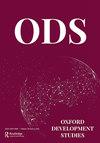Intergenerational effects of improving women’s property rights: evidence from India
IF 1.2
Q3 DEVELOPMENT STUDIES
引用次数: 4
Abstract
ABSTRACT This paper analyzes the intergenerational effects following the positive changes in women’s inheritance rights in India. Using the Indian Human Development Survey data for rural India and a difference-in-differences strategy, we find that the property rights reform significantly empowered women through increased education. However, we find no intergenerational effect of the reform on children’s education. We explore two potential mechanisms to explain these results: the role of status conflict among spouses and that of a child’s birth-order and gender. Given that a woman’s bargaining power may depend on her relative position to that of her husband, we investigate this channel and find a significant decrease in children’s education in households where fathers are less educated than mothers. Accounting for a child’s birth-order and gender, we find no evidence of son-preference through the education channel.改善妇女财产权的代际效应:来自印度的证据
本文分析了印度妇女继承权发生积极变化后的代际效应。利用印度农村人类发展调查数据和差异中的差异策略,我们发现产权改革通过提高教育水平显著增强了妇女的权能。然而,我们没有发现改革对儿童教育的代际效应。我们探索了两种潜在的机制来解释这些结果:配偶之间的地位冲突的作用以及孩子的出生顺序和性别的作用。考虑到女性的议价能力可能取决于她与丈夫的相对地位,我们调查了这一渠道,发现在父亲受教育程度低于母亲的家庭中,孩子的受教育程度显著下降。考虑到孩子的出生顺序和性别,我们没有发现通过教育渠道重男轻女的证据。
本文章由计算机程序翻译,如有差异,请以英文原文为准。
求助全文
约1分钟内获得全文
求助全文
来源期刊

Oxford Development Studies
DEVELOPMENT STUDIES-
CiteScore
2.70
自引率
0.00%
发文量
20
期刊介绍:
Oxford Development Studies is a multidisciplinary academic journal aimed at the student, research and policy-making community, which provides a forum for rigorous and critical analysis of conventional theories and policy issues in all aspects of development, and aims to contribute to new approaches. It covers a number of disciplines related to development, including economics, history, politics, anthropology and sociology, and will publish quantitative papers as well as surveys of literature.
 求助内容:
求助内容: 应助结果提醒方式:
应助结果提醒方式:


